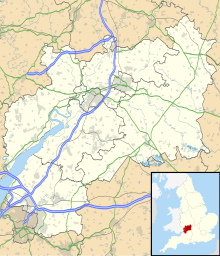Minchinhampton Common
| Site of Special Scientific Interest | |

Minchinhampton Common flowering
|
|
| Area of Search | Gloucestershire |
|---|---|
| Grid reference | SO855010 |
| Coordinates | 51°42′29″N 2°12′38″W / 51.707997°N 2.210522°WCoordinates: 51°42′29″N 2°12′38″W / 51.707997°N 2.210522°W |
| Interest | Biological/Geological |
| Area | 182.7 hectare |
| Notification | 1972 |
| Natural England website | |
Minchinhampton Common (grid reference SO855010) is a 182.7-hectare (451-acre) biological and geological Site of Special Scientific Interest in Gloucestershire, notified in 1972.
The site is owned and managed by the National Trust. The common is one of the largest grassland commons in the Cotswold area. It is south of Rodborough Common SSSI. Both commons are on Jurassic limestone and are a central plateau with steep sides. They drop down to the Nailsworth valley on the west side and the Frome valley on the north side. The site designation includes the outlying areas of Iron Mills and Littleworth Commons.Neu-Lindsey Nature Reserve adjoins the western edge of Minchinhampton Common.
Minchinhampton Common is of both geological and biological importance. There are disused quarries near the centre which provide fossil evidence for research purposes. It is unimproved, herb-rich grassland. There are five units of assessment
The quarries are one of the most important Bathonian (Middle Jurassic) research sites in the United Kingdom. The fossil limestones provide examples of various marine species including bivalve and gastropod fauna including limpets and thick-shelled sea snails, coral, crustaceans and reptiles. The site provides opportunities for significant further research on the local rock strata of the Minchinhampton and Burleigh limestones, and the relationship to the Bathonian successions to the east and south.
...
Wikipedia

